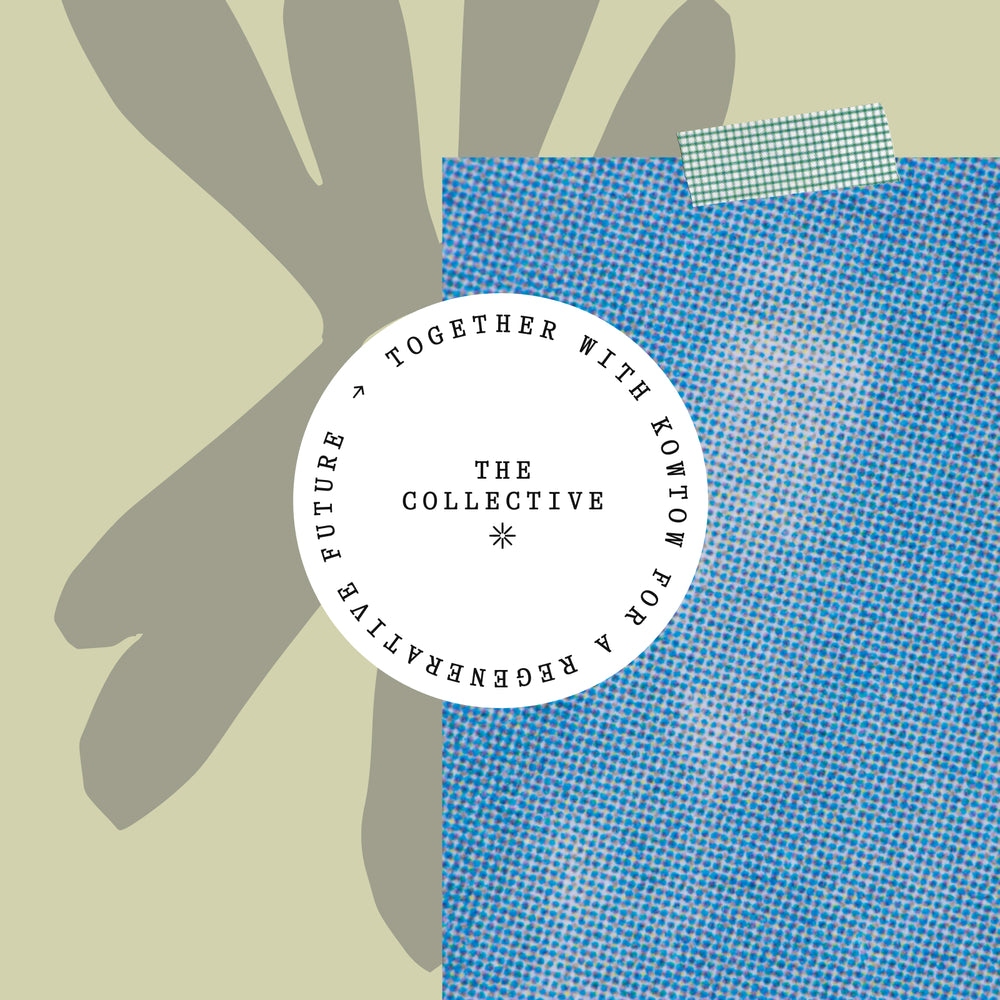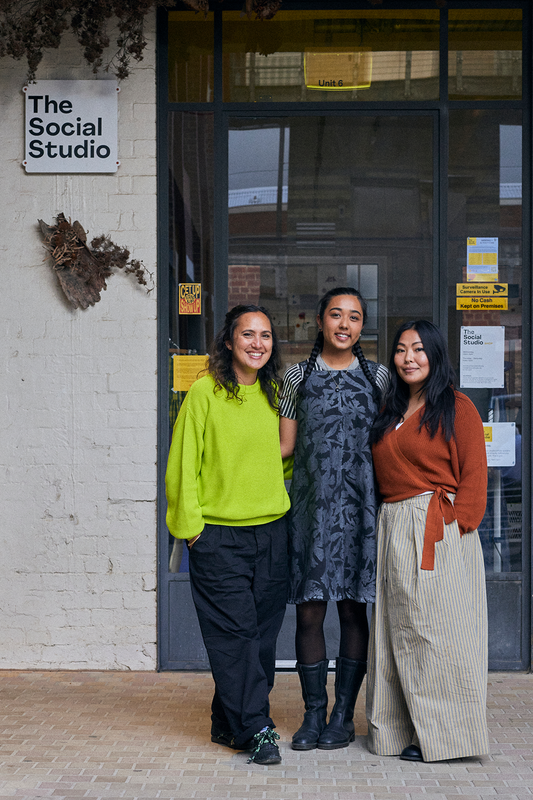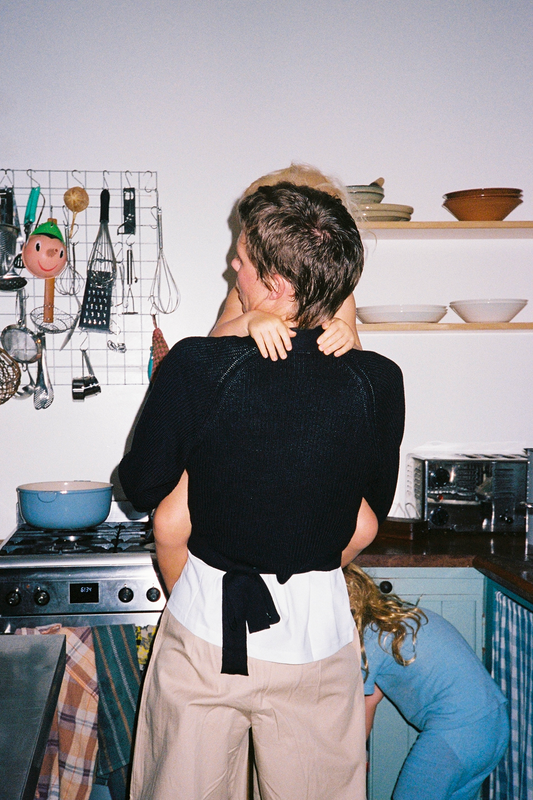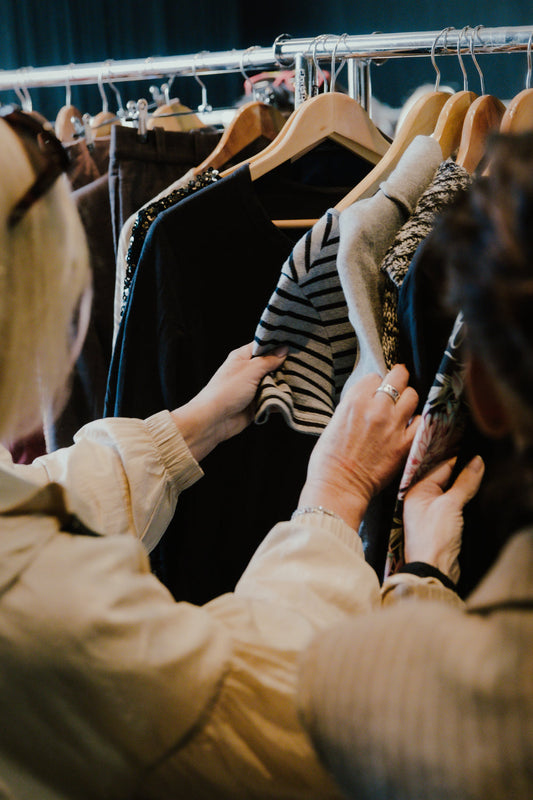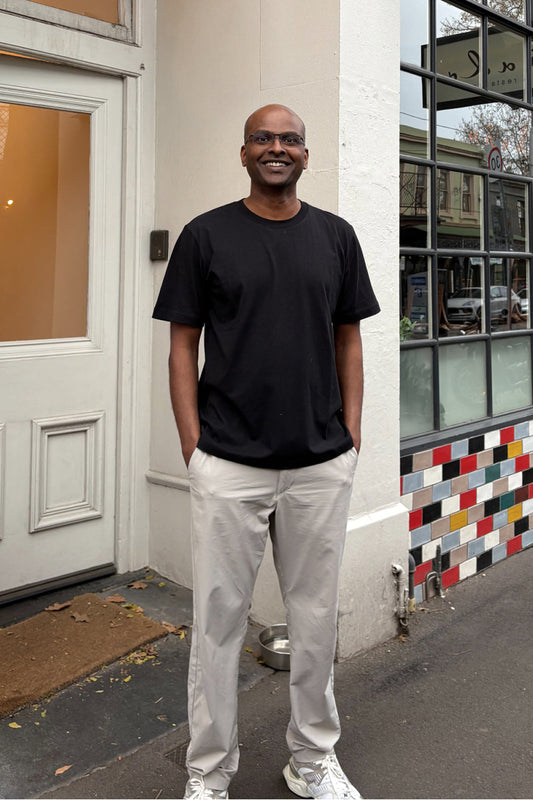 Gosia Piątek founded Kowtow in 2006 with a vision to revolutionise an industry, with transparency and sustainability as its first approach. Here she tells us how she landed on clothing as the product she wanted to make, the journey to making it and what her vision for the future of Kowtow is.
Gosia Piątek founded Kowtow in 2006 with a vision to revolutionise an industry, with transparency and sustainability as its first approach. Here she tells us how she landed on clothing as the product she wanted to make, the journey to making it and what her vision for the future of Kowtow is.
Gosia, our Kowtow community will recognise you as our founder but may not know your personal story, can you share a bit about your early life and move to Aotearoa?
I came to New Zealand with my Mum, Dad and older brother as political asylum refugees from Poland via a two year stint in a refugee camp in Italy. This was 1985 and Poland was under the communist thumb. The country had a locked border, meaning no one could leave. Food was bought via stamps and literature was highly monitored by the state. My father was pressured to vote for a party he didn't believe in and after the Chernobyl explosion, my parents had enough and decided to leave Poland.
Mum pretended she was part of a car racing club so border control gave us permission to leave on “holiday.” We packed up the car with fake holiday bits and left telling only my grandparents, with very little money. We settled for two years in a small seaside town called Latina, near Rome, where we were provided with a home and food. Times were different back then and resources weren’t as tight as they are now, so being a refugee in the 1980s compared to now I imagine, is very different. I attended school in Italy for two years. My parents only talk fondly of their time in Italy and how kind everyone was to us. We waited to be granted refugee status in either Canada, Australia or New Zealand and the rest is history, I guess.
People may be surprised to learn that you had no experience as a designer when you founded the brand in 2006. What inspired you to start Kowtow? And what motivated you to prioritise a commitment to ethical and sustainable fashion in your brand?
At the age of 27, I was very passionate about starting my own business. I was very motivated to understand where a necessary product, such as clothing, originated from and how it could return back into the earth, without causing harm to people or the environment.
I researched food, clothing and shelter. At the time, my life and business partner ran a tshirt brand in London and had perfect skills to accompany my business drive and determination. So we settled on a certified Fairtrade organic cotton clothing brand. Clothing is a basic human need and I wanted to revolutionise the industry, with transparency and sustainability as a business first approach (not only profits). I also always loved fashion and sewed my own clothing in high school and felt confident in the shapes I wanted to design. I have always loved an off the body, androgynous, utilitarian and minimal aesthetic and wanted the clothing to represent this design vision, without compromising the environment and people.
So from the very beginning in 2006, I said no to zips as they were made up of too many different unrecyclable elements and after learning about the Fairtrade Labelling Organisation, I was certain this was our path to better understand the cotton supply chain and look after the growers, traditionally the least looked after and taken advantage off in any commodity.
What is the ultimate long-term vision for Kowtow? What motivates you to continue leading Kowtow on its mission towards a healthier planet and a fairer world?
Our vision is for clothing to come from the earth and then be returned back to the earth. We are so close to our plastic free goal which we will achieve in February 2024, but I also believe that when you reach one goal another arises.
The ultimate long term goal is to be completely circular and remake new garments from our old ones.
At Kowtow, we strive to change the fashion industry for the better. That means we are accountable to our entire supply chain from seed to garment. From the workers along the way, to our workroom and store employees. When someone new starts at Kowtow we always say, the only constant here is change. It’s absolutely exhausting but the planet doesn't need us to be comfortable as we learn about slavery and climate change. It requires brave change makers.
As we learn about the environment and the people around us, we have to strive to improve and take risks. It’s scary in business as we have bills and wages to pay, but without calculated bravery we will get stuck in a cycle of only profits, I would rather fail than not be brave.
After all of the necessary steps have been taken for repair and recycling. In 20 years time, can we imagine a future of only recycled clothing that is also circular. Will governments help us in this journey? We try so hard as designers to respond to the issues we face, but at some point we need proper recycling and localised facilities.
Tell us about Kowtow’s mission to replace one million synthetic garments with Fairtrade organic cotton alternatives?
Last year we did a great planning session to understand what Kowtow will look like in ten years time. We are solution providers tackling a nasty industry, but even so “growth” feels like a bad word. Growth is associated with corporate greed. However, if we don’t grow and provide people with an ethical, sustainable and circular solution in their wardrobes, then who will? The research and development that is poured into our ranges is so in depth, that I truly feel Kowtow is a great current solution to the unethical, plastic, poor quality garments that flood our market.
So, we came up with a figure of replacing one million synthetic garments from people's wardrobes with a Fairtrade organic cotton alternative that is plastic free, comes with free repair and is circular. We came up with a million, because it takes us out of our New Zealand market to achieve this ambitious number and be a global solutions provider. We now have eight years to achieve this goal, it’s a bumpy ride but such is life. A massive goal like this gave us the bravery to open our first ever Kowtow Australia store in Melbourne this year. Without an ambitious goal we would remain tiny and that feels like all of our work in mastering cotton would only be experienced by so few people. I truly feel our concept should be mainstream - in fact all global high street brands should also be putting the planet and people first. So if they’re not going to do it, Kowtow can.
I’d love to hear about your relationship with our Fairtrade farmers and partners in India. When did these relationships begin and how integral are they to the Kowtow story?
I wanted from the beginning in 2006 for Kowtow to be equally about the people involved in the production of our ranges as well as the environment. For me, the two go hand in hand. The more I researched Fairtrade, the more I realised this was the path for Kowtow, as it gave that supply chain traceability from seed to garment.
I took my first trip to India as soon as I could to understand more about the farming practices and how we could support something that truly started with how the cotton was grown. I saw for myself the regenerative farming practices that I believed in, small lots of organic cotton planted alongside food crops to feed farmer communities to promote soil fertility and biodiversity. Crops were rain-fed and hand-picked which all just clicked into place so perfectly for Kowtow.
Fairtrade empowers producers of raw materials, who can be exploited by the developed world, to group together and be protected by a guaranteed price for their raw goods. Then a premium is paid on top of that to Fairtrade producer groups and this money contributes towards community projects at the farm level. Money is used to fund necessary projects such as schooling, hearing aids and storage of monsoon water (as our farms are only rain fed). Our Fairtrade certified farms are also certified organic. I felt that the people growing the cotton should only work in safe conditions, without nasty chemicals and in tune with mother nature.
It means so much to me that when people buy our clothes they are also contributing to important Fairtrade projects and to regenerating the land to support local families.
Fairtrade and organic combine to serve people and planet. This is integral to Kowtow and reflects my original vision. We are truly creating clothing that comes from the earth, treats people fairly, and is then returned back to the earth without harm.
What are some pivotal business decisions you’ve made in your time, did they have the outcome you expected/intended?
Choosing to be very staunch on my values in fashion was considered pretty out there back in 2006. However, with the media attention on unethical production and climate change, people are now educated and understand how frivolous and grubby our industry is, so are looking for solutions and I do believe this is a huge factor for us thriving. Actually I get asked this question a lot when people are first starting out in fashion and creating their brands. I always say to be a solutions provider, that is our role now as designers of any product. Let's move forward into a biodiverse, clean and healthy planet.
Why was it important to you and to Kowtow to develop a Sustainability Strategy and Impact Report? Are there any achievements out of that work that you are particularly proud of?
We wanted to push ourselves even more and align the business with the United Nations Sustainable Development Goals (SDGs), we wanted to see ourselves working towards goals that experts have come up with and deem as important for the evolution of humanity in a healthy way. So we got to work and created a Sustainability Strategy which gives us goals to achieve broken down into years, it is much easier for us to see these huge goals broken down into bite sized chunks. We split the strategy into sections for us to work under - People, Planet, Prosperity. We work on these goals through the year and have two teams that meet fortnightly to discuss how we are progressing and help each other to move towards completing them.
Our Impact Report is more quantifiable. For example it explains how many garments we will save from the landfill with our Repair Programme. We have completed over 1000 free repairs since the inception of the programme in 2018. In 2023, our two person in-house team has completed 422 repairs.It fills me with massive pride that Kowtow is not only creating beautiful garments made under fair labour conditions, that are natural and circular, but that we are also as a company working towards huge SDG global goals, it takes us beyond fashion.
Working towards achieving 0% plastic has been huge for the Kowtow team. What was the catalyst to look at every element of the garment?
During covid we made a very bold move to remove all of our other fibres that entered into our ranges over the years and go back to our roots of only using Fairtrade organic cotton - a singular natural fibre. We decided as a group that circularity is key and having other fibres compromised this, simple material choice is cleaner and easier. However this did mean we had to let go of our cotton/elastane garments which were some of our best sellers. We also have removed any trims that contain plastic. Our buttons are now shells and nuts, our elastic is natural rubber and our fusing is cotton with a biodegradable glue. From February 2024 our collections will be stitched with 100% organic cotton and we will be officially 0% plastic - jersey, knitwear, denim and woven garments.
What change do you see in the industry since you started? Does it feel like there has been a significant move to creating with the planet and people in mind?
I can see that traditional crafts and makers are genuinely appreciated and people seem more intrigued by the making process. They want to know where something is from and how it was made. Unfortunately with larger companies, there is a lot of greenwashing and in Europe there is the start of a crackdown towards false advertising. But honestly I don’t know if I can see any improvements. When the statistics are out each year that the earth is warming up and breaking records every 12 months and the COP (United Nations Climate Change Conference) each year seems to be a giant talk fest. Fossil fuel companies seem to be making more money than ever and governments are creating climate laws at snail's pace … why just ban plastic straws? Get rid of all single use plastic! Be bold and brave. I don’t understand, how hard can it really be?
